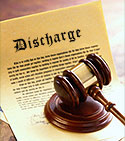Bankruptcy Timeline
 |
Prior
Bankruptcy Prevents Filing of Chapter 7
You are prohibited from receiving a
discharge under Chapter 7 if you
received a discharge in a bankruptcy within
the last 8 years.
A discharge may
still be granted if the prior bankruptcy was
under Chapter 12 or 13 and paid 100% of
allowed unsecured claims,
or paid at least
70% allowed unsecured claims and the plan
was
proposed in good faith and was the your
best effort.
This restriction does not apply to
the filing of a Chapter 13 after any
prior
bankruptcy.
11 U.S.C. Sec 727(a)(8 & 9) |
 |
Transfer,
concealment or destruction of property
prevents
discharge in Chapter 7
The court may
deny you discharge of all debt if you
attempted
to hinder, delay or defraud a
creditor when you transferred, removed,
destroyed, mutilated, or concealed property
within one year prior to
the filing of your
Chapter 7 petition.
The trustee
may recover the property from the person to
whom you
transferred it.
11 U.S.C. Sections 727(a)(2),
548(a)(1) |
 |
Payment to
Relative or Insider is a Preference
A total of
$600 or more in money or property which is
paid to a
creditor that is a relative or
insider (certain business associates)
within
a year prior to filing is a preference.
The Trustee may recover
preferences and
divide the money between all creditors.
In Chapter
13, you may be able to prevent the trustee
from going
after the relative by increasing
the amount paid into your plan.
11 U.S.C. Sections 547(b)(4)(B),
547(c)(8),
101(31) |
 |
Dismissal of
prior bankruptcy prevents filing Chapter 7
or 13.
You may not
file any bankruptcy if you filed a previous
bankruptcy
which was dismissed in the
preceding 180 days either (1) on the
court's
order because of your willful failure to
obey orders of the
court or to appear in
court when required; or (2) at your request
after the filing of a request for relief
from the automatic stay.
11 U.S.C. Sec 109(g) |
 |
Minimum
Residency Requirement
You must be a
resident in the state in which you are
filing for the
last 90 days. If you have
not resided in the state that long, you
can
only file in the state where you have
resided, or which has been
your principal
place of business or which has been the
location
of your principal assets for the
majority of the last 180 days.
Payment to
Creditor is a Preference
A total of
$600 or more in money or property which is
paid to
a creditor within 90 days prior to
filing is a preference. The
Trustee
may recover preferences and divide the money
between
all creditors.
In Chapter
13, you may be able to prevent the trustee
from going
after the creditor by increasing
the amount paid into your plan.
11 U.S.C. Sections 547(b)(4)(B),
547(c)(8),
101(31) |
 |
Debt presumed
to be non-dischargeable
Debt of
$1,075 for cash advances or "luxury goods or
services"
incurred within 60 days before the
Bankruptcy is filed is
presumed to be
non-dischargeable.
Applies to
Chapter 7 cases, and to hardship discharge
in Chapter 13.
11 U.S.C. Sections 523(a)(2),
1328(b) |
Bankruptcy Filed
 |
Commencement
of Case
A voluntary
bankruptcy is commenced when you file a
petition
with the Bankruptcy Court
requesting protection from your creditors
under Chapter 7 or Chapter 13. A husband
and wife may
file one petition together and
commence a joint case.
The filing
also puts a stay under
11 U.S.C. Sec362 into effect
prohibiting
collection actions.
11 U.S.C. Sections 301,
302,
101(42) |
| |
Deadline to
File Schedules and Financial Statement, and
Chapter 13 Plan
Within 15
days after filing the Chapter 7 or Chapter
13 petition
that commenced your case, you
must file schedules listing
your assets and
liabilities, your current income and
expenditures, executory contracts and
unexpired leases,
and a statement of your
financial affairs.
Bankruptcy Rule 1007(c); see also
11 U.S.C. Sec 521
In Chapter
13, the Plan must also be filed within 15
days
after the Bankruptcy was filed. The
plan provides for submission
of future
income and the treatment of your creditors,
specifying when and how much each kind of
creditor will receive.
Bankruptcy Rule 3015(b) |
 |
Court Mails
Notice of Commencement of Case
Approximately
18 days after your case is commenced, the
court
mails a Notice of Commencement of
Case to you and to the
creditors you
have included in your mailing list. The
notice contains meeting date, deadlines for
objections to
discharge and for filing
Proofs of Claims. |
| |
Chapter 13
only: Deadline to Notice Chapter 13 Plan
In the
Western District of Missouri, your attorney
must mail
your Chapter 13 Plan to all
creditors after the Chapter 13 Plan is
filed. |
| |
Chapter 7
only: Deadline to file Statement of
Intention
Within 30
days after filing the Chapter 7 petition
that commenced
your case (or before the Sec
341 meeting if that is earlier),
you must
file a Statement of Intention
indicating whether you will
be surrendering
or keeping property secured by consumer
debt.
If you are keeping secured property,
you will need to indicate
whether you intend
to: (1) reaffirm the debt and continue to
make
the payments remaining obligated for
the balance of the debt,
or (2) redeem the
property by immediately paying the value of
the property and receive a discharge for the
balance of the debt.
A copy of the
Statement of Intention must be served
on
the trustee and the creditors named in
the statement on or
before the filing of the
statement.
11 U.S.C. Sec 521(2)(A); Bankruptcy Rule
1007(c) |
| |
Chapter 13
only: First Payment Due Under Chapter 13
Plan
You must make
your first payment under the Chapter 13
Plan
within 30 days after the plan was
filed.
If your plan
was filed with the petition which commences
your
case, your first payment is due within
30 days of the start of the
case. Since the
plan must be filed within 15 days after the
commencement of your case, the latest date
you may start making
payments is 45 days
after the filing of the case.
11 USC Sec1326(a)(1) |
 |
Sec 341 Meeting
Section 341
(the symbol "Sec" means section) of the
Bankruptcy
code requires the Trustee to
preside at a meeting of
creditors
within a "reasonable time." This meeting is
usually
held approximately six weeks after
Bankruptcy is filed.
You (as the
debtor in a Bankruptcy case) are required to
attend
this meeting and testify under oath,
but most creditors do
not come to the
meeting. The failure of creditors to attend
the
meeting does not effect their right to
challenge the discharge in
a Chapter 7 or to
object to the plan in a Chapter 13. If you
do not attend, your case will be dismissed.
11 USC Sec 341 |
| |
Chapter 7:
Deadline in Chapter 7 to perform under
Statement
of Intention
In Chapter 7,
within 45 days after you filed Statement
of Intention,
you are to perform as you
indicated. In that statement, you
were
required to state whether you would be
surrendering or
keeping property secured by
consumer debt. If you were keeping
secured
property, you would have indicated whether
you intended
to: (1) reaffirm the debt and
continue to make the payments
remaining
obligated for the balance of the debt, or
(2) redeem
the property by immediately
paying the value of the property
and
receiving a discharge for the balance of the
debt.
11 U.S.C. Sec 521(2)(B) |
| |
Deadline for
creditors or Trustee to object to claim of
exempt
property
Creditors and
the Trustee have until 30 days after the
conclusion
of the creditor's meeting
under Sec 341 to object to the property
you
have claimed as exempt in Schedule C. While
most
341 meetings are concluded on the
same day they are set, it
is not unusual for
a meeting to be continued to a subsequent
date, which will extend the time that
creditors have to object.
Bankruptcy Rule 4003 |
 |
Chapter 7:
Deadline in Chapter 7 for objection to
discharge
of a particular debt under Sec523(c)
Creditors
have until 60 days after the first date set
for creditor's
meeting under Sec 341 to file a
complaint under Sec 523(c). Sec 523(c)
allows
creditors to object to the discharge of
debts which were
obtained by false
pretenses, a false representation, or actual
fraud; debt from fraud or defalcation while
acting in a
fiduciary capacity, embezzlement
or larceny; debt for willful and
malicious
injury; and debt incurred in a divorce or
separation
(other than child support and
spousal maintenance which are
not discharged
even without an objection to discharge).
The most
common objection to discharge of a debt is
based on
523(a)(2). This section presumes
that charges totaling $1,000
or more to one
creditor within 60 days before the case is
commenced are not discharged, if they are
for luxury goods or
services, or cash
advances. This section also denies a
discharge
to debt extended because the
creditor relied upon a credit
application
which was materially false.
Bankruptcy Rule 4007(c); see also
11 USC Sec 523 |
| |
Chapter 7:
Deadline for objection to discharge of all
debt
under Sec 727(a)
Creditors
have until 60 days after the first date set
for creditor's
meeting under Sec 341 to file a
complaint under Sec 727(a). Sec 727(a)
allows
object to the discharge of all debts because
of
misconduct including transfer,
destruction or concealment
of property;
concealment, destruction, falsification or
failure to
keep financial records; making
false statements; withholding
information;
failing to explain losses; failure to
respond to
material questions; having
received a discharge in a prior
case filed
within the last 6 years.
Bankruptcy Rule 4004(a); see also
11 USC Sec 727(a) |
| |
Chapter 7:
Deadline for U.S. Trustee or court to move
to
dismiss case for substantial abuse under
Sec 707(b)
Until 60 days
after the first date set for creditor's
meeting
under Sec 341, the U.S. Trustee or the
court may move to
dismiss a case in which
debts are primarily consumer debts
if it
finds that the granting of relief would be a
substantial
abuse of the provisions of
Chapter 7.
Substantial
abuse has been interpreted by a number of
courts
to mean having sufficient disposable
income to pay more
than half of your
unsecured debt over the next 36 months.
Bankruptcy Rule 1017(e); see also
11 USC Sec 707(b) |
 |
Chapter 13:
Deadline in Chapter 13 to file all due but
unfiled tax returns
For cases
filed in the Westerm District of Missouri,
you must
file all due but unfiled tax
returns within 60 days after the
first date
set for the Sec 341 Meeting. |
 |
Discharge
entered in Chapter 7 case
Court rules
require that the discharge be entered
"forthwith"
after the expiration of the time
for objecting to discharge or
moving to
dismiss the case. The time for those
objections
expires 60 days after the first
date set for creditor's meeting.
The discharge is not absolute or final.
The trustee can ask that
the discharge be
set aside if you do not turn over non-exempt
property, and for other violations of the
debtor's duties.
Bankruptcy Rules 4004(c)(1),
4004(a),
1017(e) |
| |
Deadline for
non-government creditor to file its Proof
of Claim
A creditor,
other than a governmental unit, must file
its Proof
of Claim within 90 days
after the after the first date set
for
creditor's meeting under Sec 341 in order to
share in payments
from the estate.
Bankruptcy Rule 3002(c) |
| |
Deadline for
governmental unit to file Proof of Claim
A
governmental unit, such as the Internal
Revenue Service,
must file its Proof of
Claim within the commencement of the
case in order to share in payments from the
estate.
Bankruptcy Rule 3002(c)(1) |
 |
Minimum
length of payments under Chapter 13 Plan
Unless all
allowed claims are paid sooner, plan
payments
must continue for the three-year
period beginning on
the date that the first
payment is due under the plan.
During this
period, the plan must provide that all
of
the debtor's projected disposable income is
committed
to the plan. (This requirement
comes into effect only
if the trustee or the
holder of an allowed unsecured
claim
objects; it has been our experience that the
trustee will always object.)
11 U.S.C. Sections 1325(b)(1),
1322(d) |
| |
Discharge
entered in Chapter 13
Upon
completion of plan payments the discharge in
Chapter 13
is entered.
11 U.S.C. Sec 1328 |
| |
Maximum
length of payments under Chapter 13 Plan
The maximum
length of a Chapter 13 plan is five years
beginning
on the date that the first payment
is due under the plan.
After the third year
of the plan, the plan no longer needs to
provide that all of the disposable income be
committed to the plan.
11 U.S.C. SecSec 1325(b)(1),
1322(d) |
| |
Discharge
entered in Chapter 13
Upon
completion of plan payments the discharge in
Chapter
13 is entered.
11 U.S.C. Sec 1328 |
|
|
|